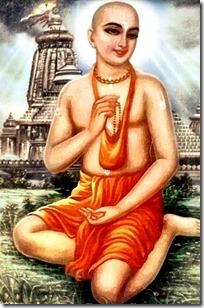 “Even if you are considered to be the most sinful of all sinners, when you are situated in the boat of transcendental knowledge, you will be able to cross over the ocean of miseries.” (Lord Krishna, Bhagavad-gita, 4.36)
“Even if you are considered to be the most sinful of all sinners, when you are situated in the boat of transcendental knowledge, you will be able to cross over the ocean of miseries.” (Lord Krishna, Bhagavad-gita, 4.36)
Download this episode (right click and save)
अपि चेद् असि पापेभ्यः
सर्वेभ्यः पाप-कृत्-तमः
सर्वं ज्ञान-प्लवेनैव
वृजिनं सन्तरिष्यसि
api ced asi pāpebhyaḥ
sarvebhyaḥ pāpa-kṛt-tamaḥ
sarvaṁ jñāna-plavenaiva
vṛjinaṁ santariṣyasi
Friend1: One of the aspects of the Vaishnava tradition, as it is presented in the modern day, is the underlying renunciation recommended. This is what stands out from other kinds of religion, which seem more like faiths to me than distinct ways of living.
Friend2: You mean vairagya?
Friend1: Or nivritti-marga. Whatever you want to call it.
Friend2: Hmm. I thought the emphasis was on the positive activities. In the simplified version, chanting, dancing and feasting. Chant the holy names: Hare Krishna Hare Krishna, Krishna Krishna, Hare Hare, Hare Rama Hare Rama, Rama Rama, Hare Hare. Dance if you feel it, taking the lead of Chaitanya Mahaprabhu, the person who inaugurated the sankirtana movement in this age; though dancing in devotional ecstasy is as timeless as the Supreme Lord Himself. Feasting? Come on. That has been around forever. You are eating in enjoyment, but with a specific kind of consciousness.
 Friend1: Okay, but someone who wants to get really serious, wherein they formally accept a teacher and the like, has to agree to four basic principles. No meat eating. No gambling. No intoxication, and no illicit sex.
Friend1: Okay, but someone who wants to get really serious, wherein they formally accept a teacher and the like, has to agree to four basic principles. No meat eating. No gambling. No intoxication, and no illicit sex.
Friend2: Sure. Think of it like enrolling in a boarding school. Military students have to get up at a certain time of the day. The bed has to be made. They should eat a certain amount, train to develop a certain physical shape, avoid getting drunk, and the like. In the end those restrictions have no relation to doing the actual job. If you are on the battlefield, the skill is in identifying enemies, choosing the appropriate time to attack, and properly defending yourself. The time of day you woke up that morning is of little concern.
Friend1: I get it, but it is also a way of filtering out candidates.
Friend2: What do you mean?
Friend1: Someone once told me that the reason introductory biology courses in college are so large, up to five hundred students, and tough at the same time is because in the beginning a lot of people might consider a career in medicine. If the institution can weed out the pretenders through a difficult first taste of the sciences, then the students avoid a tough lesson later on.
Friend2: Therefore, you consider the restrictions for the bhakti-yoga student to be a way to find out who is serious and who is not.
Friend1: I think that the teacher doesn’t want to waste his time. They would pass on the timeless wisdom of the Vedas to every person if they could, but it is better to develop the souls who are willing to put in the effort.
Friend2: Okay. Makes sense to me.
Friend1: Here is my question for today. Suppose that you accepted a specific teacher. They are amazing. They always speak of the Supreme Lord and devotion to Him. They are tolerant and at the same time very serious. They are learned in shastra and they appear to be above the demands of the material world.
Friend2: How so?
Friend1: They do not require a lot of sleep. They are content with whatever food in the mode of goodness people offer to them. Their only focus is on spreading the message of Divine love, going to wherever they have to, taking whatever risks necessary.
Friend2: And they chant regularly?
Friend1: Yes. Constantly. Both silent japa and boisterous sankirtana.
Friend2: Cool. What is the question?
Friend1: What if you find out later on that the teacher has a minor flaw or two? As an example, they take a mild intoxicant every now and then. It is not that big a deal to me, since there appears to be a justifiable reason.
Friend2: Medicinal use?
Friend1: Yeah, sort of. It helps them to stay awake to accomplish the task of publishing.
Friend2: Oh, as in writing books on bhakti-yoga and the science of self-realization?
Friend1: Yes. Exactly. The problem is, others will point to hypocrisy. Here the teacher is demanding sobriety from the students. He rails against the problems with intoxication in the modern world. Then behind closed doors he is just as tainted.
Friend2: That would be the pessimistic outlook. People will certainly have that opinion. Look at the case of Chaitanya Mahaprabhu. He tried to be the ideal sannyasi, a person in the formal renounced order. Yet one time a scrutinizing person saw that Mahaprabhu was eating so much. The food was offered to Him by well-wishers, and so there was no underlying desire to eat palatable dishes. Still, the criticism was there and Mahaprabhu took it to heart.
Friend1: Others could use the blemish as an excuse to violate the principles themselves. What should I think of the whole situation?
Friend2: If it were me, I would pay homage to that intoxicant.
Friend1: Haha, what? Why?
Friend2: If it helped my guru to deliver Vedic teachings to others, to help bring them closer to their original friend, Shri Krishna, then the intoxicant plays such an important role. It becomes spiritual.
Friend1: Okay, but isn’t that a convenient excuse? Couldn’t others say the same about alcohol?
“I drink because it relaxes me, and when I’m relaxed I can better focus on Shri Krishna.”
Friend2: That is the danger in imitating the advanced souls. You asked me how I would view this, and I told you. If it were a cheater guru, a pretender, then I would have a different opinion. You should also remember that the restrictions are not made up out of nowhere.
Friend1: What do you mean?
Friend2: They descend from shastra. If you read carefully, there is the warning to avoid addiction to certain behaviors. Drinking wine, hunting animals, chasing after women, and playing dice. Brahmanas, those in the priestly order, should particularly avoid alcohol. There are so many restrictions and exceptions. It is difficult to decipher what is acceptable and what is not. For this case I would try to be understanding. See the final outcome. A mild intoxicant used on occasion is much different than getting drunk all the time. Still, some advanced souls of the past did frequently indulge in intoxication.
Friend1: That is my point. How can I decipher if this is a case of an advanced person slightly breaking the rules or someone just pretending to be advanced in order to attract followers?
 Friend2: You have to judge for yourself. Shri Krishna explains in the Bhagavad-gita that a sadhu sometimes falls down. They slip up. The material world is a difficult place to live in, after all. If there is a genuine effort applied, to stay connected to God and serve the devotees, then those supposed indiscretions are always forgiven.
Friend2: You have to judge for yourself. Shri Krishna explains in the Bhagavad-gita that a sadhu sometimes falls down. They slip up. The material world is a difficult place to live in, after all. If there is a genuine effort applied, to stay connected to God and serve the devotees, then those supposed indiscretions are always forgiven.
In Closing:
Spiritual master everything to me,
But once odd behavior to see.
That intoxicant using mild,
Not addicted or indulgence wild.
But what now to do?
Sign of other deviations too?
Advanced souls sometimes rules breaking,
Judge at full picture of devotion taking.

No comments:
Post a Comment